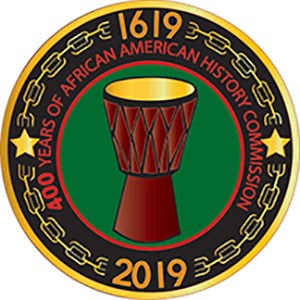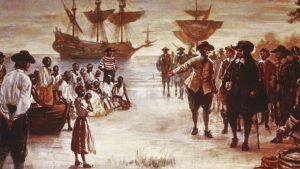
You may have missed this federal legislation so I am providing a streamlined version of it. The commission expires in 2020 with the scheduled production of a final report.
H.R.1242 – 400 Years of African-American History Commission Act
115th Congress (2017-2018)
Public Law No: 115-102 (01/08/2018)
To establish the 400 Years of African-American History Commission, and for other purposes.
(1) Commemoration.–The term “commemoration” means the commemoration of the 400th anniversary of the arrival of Africans in the English colonies, at Point Comfort, Virginia, in 1619.
(2) Commission.–The term “Commission” means the 400 Years of African-American History Commission [of 15 people].
The Commission shall–
(1) plan, develop, and carry out programs and activities throughout the United States
– to recognize and highlight the resilience and contributions of African-Americans since 1619;
– to acknowledge the impact that slavery and laws that enforced racial discrimination had on the United States;
– to educate the public about–(i) the arrival of Africans in the United States; and (ii) the contributions of African-Americans to the United States.
(2) encourage civic, patriotic, historical, educational, artistic, religious, economic, and other organizations throughout the United States to organize and participate in anniversary activities to expand understanding and appreciation of—(A) the significance of the arrival of Africans in the United States; and (B) the contributions of African-Americans to the United States;
(3) provide technical assistance to States, localities, and nonprofit organizations to further the commemoration; [FUNDING UP TO $20,000 per application!!!!!]
(4) Coordination. coordinate and facilitate for the public scholarly research on, publication about, and interpretation of–(A) the arrival of Africans in the United States; and (B) the contributions of African-Americans to the United States
(5) ensure that the commemoration provides a lasting legacy and long-term public benefit by assisting in the development of appropriate programs; and
(6) help ensure that the observances of the commemoration are inclusive and appropriately recognize the experiences and heritage of all individuals present at the arrival of Africans in the United States.
The strategic plan for the Commission can be accessed through the National Park Service website. It provides the following timeline.
TIMELINE: (First quarter of 2019): SHOULD BE DONE BY NOW
Develop a framework for ways in which civic, patriotic, historical, educational, artistic, religious, economic, research-based individuals and institutions may partner with the Commission to ensure a successful 2019 across the Nation and collaborate accordingly.
Establish a clearinghouse for 2019 African American commemorative events.
– Work with museums and other key organizations to calendar significant events.
– Create an online master calendar of events.
Secure adequate funds to support the Commission in achieving its goals
Utilize social media and African American community information sharing networks to share information about Commission-sanctioned programs, events, and activities.
– Hire a web designer.
– Recruit volunteers to maintain a robust social media presence.
TIMELINE: (Second quarter of 2019): SHOULD BE DONE SOON
Develop, disseminate, and provide technical assistance for requests for proposals (“RFPs”) in support of the Commission’s mission work.
– Define relevant proposal criteria.
– Widely publish the criteria.
– Assist those who wish to submit proposals.
Issue grants in an amount not to exceed $20,000 based on approved RFP guidelines.
Secure grant-making funding.
– Develop grant-making criteria.
– Disseminate grant opportunities.
– Develop team to review grant proposals.
– Develop grant award timelines and procedures.
The total project budget is $6M. Key budget items include:
Operating expenses $900,000
Website and online presence $10,000
Marketing (e.g., promotion and advertising) $2,450,000
Commissioner outreach (e.g., travel, lodging) $140,000
Grant-making; scholarships $2,500,000
The most recent item on the NPS website for the Commission is a press release on a meeting held on Wednesday, February 13, 2019, at the National Museum of African American History in Washington.
I became aware of this legislation and strategic plan because of my participation in the African American 400 Year Diaspora committee through the Westchester County African American Advisory Board. Somewhere around April, I decided to look up the legislation that was the impetus for the creation of this group. At that point I found the law itself and subsequently the NPS Strategic Plan.
As you might expect, my interest was peaked when I saw that organizations could apply for up to $20,000 in funding for related activities. Naturally I began to look for the application procedures and guidelines so we could apply. I found none.
I thereupon contacted my local Congressional representative to inquire about funding. It was while waiting for the return call later that afternoon that I did some additional research on my own and found the Strategic Plan. When I notice the first quarter time frame and that we were now in the second quarter, my hopes for funding diminished significantly. There was then and continues to be no vibrant web presence. There was then and apparently still are not funding guideline and procedures as we head into the final two-plus weeks of the second quarter.
When my Congressional representative office called, she confirmed my worst fears. Do not expect much. There has been no kickoff event yet. No website, No procedures. If you expect to do anything on or around August 19, 2019, do it on your own. Do not wait for or expect federal funding though the Commission. In fact the Commission will have to raise the funding privately itself.
At this point, it seems like the primary event will be by the NPS at the “Plymouth Rock” of slavery in the English colonies. [Note that Spanish-controlled lands are not included in this anniversary. It is limited strictly to the 13 British colonies that became the United States.] There will be a new visitor center at Point Comfort, VA, at what is now Fort Monroe National Monument, in a partnership between the Fort Monroe Authority and the National Park Service.

https://www.nps.gov/orgs/1207/commission400.htm
If you want to more about the actual event in history, may I suggest a recent article in the Washington Post “She Was Captured and Enslaved 400 Years Ago: Now Angela Symbolizes a Brutal History” by DeNeen L. Brown.
In some ways it may be just as well that the national commission ends up being a mainly local event. After all, the story of slavery varies from state to state. The libraries, historical societies and museums in only one state are likely to have materials related to the 1619 event. In the other states, many such organizations may already have displayed slavery-related items during Black History Month. These organizations also may have events and exhibitions planned for August, a month that is more of a vacation time than visit your local museum time – you visit the museums of the places you travel to then!
Here in Westchester, we are thinking about what happened in Westchester and not Virginia…although Texas still garners attention due to Juneteenth. By contrast July 4, 1827, when slavery ended in New York remains unremembered. What we need here is a Bicentennial End of Slavery Commission.
There are four points to this rumination:
1. Each state has its own story to tell of the start and end of slavery in that state.
2. Each state has its own story to tell about the contribution of black Africans to their state from those brought here against their will to those who emigrated here just like white Europeans from Plymouth Rock to Castle Garden to Ellis Island.
3. The shortcomings in the African American Heritage Commission may be replicated in the American Revolution 250th Anniversary. If that Commission similarly focuses on 1776/2026 it will ignore or downplay all the events leading up the Declaration and afterwards until the British evacuation on November 25, 1783/2033.
4. History museums, libraries, and colleges provide great venues for facilitated discussions and conversations on the role of slavery in their community and the free black experience both during and after slavery. (The same actually applies for both Columbus and the American Revolution although I have not written those blogs yet.)
I mention the American Revolution because some efforts are underway here in Westchester and in New York regarding that event. I want to attend the Massachusetts History Alliance conference on June 24 and learn about what that state is doing before writing a blog about it.
In the meantime, we will keep moving forward on the 400th but will be thinking more and more what to do on an ongoing basis to tell the story of the black contribution to our county.






Dear Peter,
Thank you for this information.
While my exhibit, Racing on a Broken Road, remains in storage, I am encouraged by the emphasis on (local) contributions and the struggle to attain civil liberties.
Thank you.
Betsy